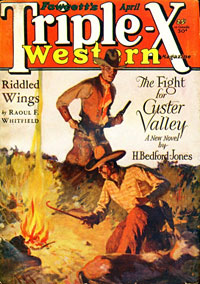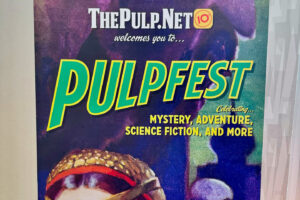 Vintage writers’ journals offer a great way to peek behind the curtains and see the goings-on in the backshops of pulp magazine publishers.
Vintage writers’ journals offer a great way to peek behind the curtains and see the goings-on in the backshops of pulp magazine publishers.
The April 28, 1928, issue of The Editor, the “journal of information for literary workers and others interested in books and writing,” includes an updated manuscript market guide for Triple-X Western Magazine, a pulp that ran from June 1924 through November 1932 (with annuals issued in 1934-36).
The following appeared in The Editor‘s Literary Market column:
Triple-X (Monthly; $.25; $2.50)
Fawcett Publications, Robbinsdale, Minn.
Short Stories: “All manner of adventure stories, in lengths up to 8,000 words. Preferred subjects in order of preference: Western, Air-War, War, Sport, Railroad, Detective Mystery, General Adventure, Sea.”
Novelettes: “Up to 20,000 words.”
Serials: “Three to five installments, with 15,000 words per installment.”
Verse: “Always a good market for adventure verse, preferably with a Western flavor. No blank verse. Verse should have strong rhythm. 25 cents a line paid, on acceptance.”
Biographies: “Arranged by special assignments.”
Payment: “One and one-half cents a word and up, on acceptance. Manuscripts are usually reported on in three weeks.”
Special Material Required: “Triple-X wants stories of cowboys in the world war, at least one in each issue. Best chance of acceptance is in the western field with stories of 3,000 to 6,000 words in length. While we sometimes have novels and long western stories scheduled for four or five months in advance, there are never sufficient short western stories.”
Suggestions to New Contributors: “Triple-X is essentially a western magazine and it is in this field that the new contributor has the best opportunity to make a sale. Next in the line of opportunity are short sport stories and stories of the world war. Our ideal war story combines a western hero with action taking place both in the air and on the ground. While Triple-X is purely fiction, the facts used as a background should be authentic. Avoid a hackneyed love theme where the girl is provided for a trite fade-out. Other than that we have no hard and fast rules regarding romance. The story is the thing. Action should be of a fast moving type but avoid over writing and over emphasis in describing action.”
Roscoe Fawcett and Jack Smalley are editors.


